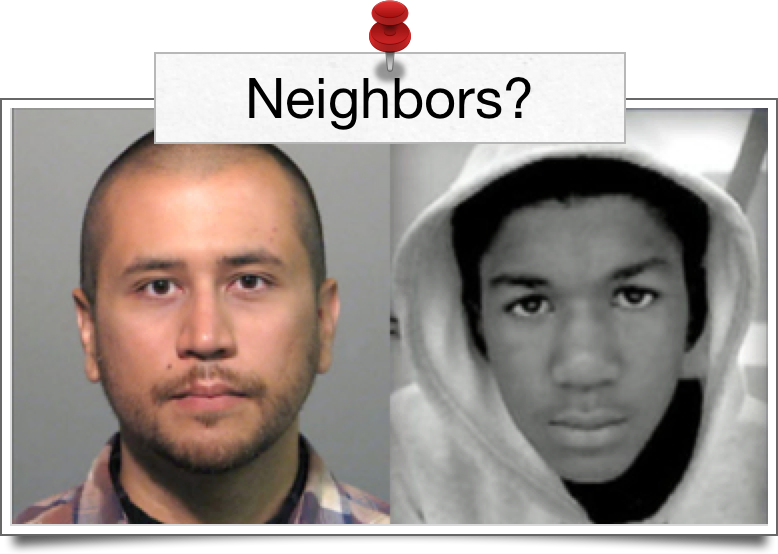George Zimmerman, photo courtesy of the Washington Post. Trayvon Martin, photo courtesy of the Trayvon Martin Foundation.
I wonder about the different possibilities that could have emerged that February 26, 2012 night in Sanford, Florida when George Zimmerman shot and killed Trayvon Martin. The outcomes might have been different if Mr. Zimmerman and Mr. Martin had felt respected and valued by the larger community, and by each other. They might have been neighbors, real neighbors, behaving neighborly toward each other; each seeking to honor the welfare of the other; each expressing their uniqueness in how they lived.
That night might have ended differently if American history was not blemished with egregious and systemic racial injustice of the dominant white class toward non-whites. It would have been different if mass incarceration didn't have a racial dimension in this country. According to Michelle Alexander, "No other country in the world imprisons so many of its racial and ethnic minorities. " That night might have ended differently if the nation's benchmark civil rights legislation and expansion of the Civil Rights Act of 1964 was not repeatedly weakened (most recently when the Supreme Court struck down the heart of the Voting Rights Act of 1965 by a 5-to-4 vote, allowing nine mostly Southern states, to change their election laws without advance federal approval). That February 26th night might have ended differently if our neighbors did not only represent a racial constituency, but a human constituency.
Each of us is created in God's image to be recognized and respected for the differentness of our skin color, and for the sameness of our spirit (and other important distinctives like place of origin, residence, religious preference, ethnicity, employment, gender, sexual orientation, and marital status, etc.). Justice is not automatic, it must be sacrificed for, intentionally worked for, so that just behaviors characterize good citizens (see model described in Isaiah 58:6-12). Though the possibilities were numerous that night, an unfortunate set of cascading choices, spanning hundreds of years, ended with a 17-year-old black American dead at the hands of a 28-year-old Hispanic with a gun. America grieves. Every American grieves.
President Barak Obama shared a very personal story on Friday, July 19th, when he invited a nation to look through the lens that many black Americans view the murder, and the process that led to Mr. Zimmerman's acquittal by jury on Saturday, July 13th. Benjamin Todd Jealous, the president and CEO of the National Association for the Advancement of Colored People, called the President's July 19th remarks a powerful moment. Mr. Obama said, "There are very few African-American men who haven't had the experience of walking across the street and hearing the locks click on the doors of cars. That happens to me—at least before I was a senator." There is a great deal of resonant pain internalized by our neighbors who represent racially and ethnically diverse groups across the United States including Latino, American Indian, and African American, to name a few.
It is difficult for white Americans to understand this pain, but it is unacceptable for white Americans to ignore it. Through intentional and attentive conversations across the community, bridging diverse groups, both inside and outside the church, we can do better than align along racial, partisan, or generational affinities, as suggested in a recent Pew Research Center study. For the church to ignore the pain is a travesty.
Mr. Obama questioned whether Florida's "stand your ground" law, which allow individuals to use reasonable force to defend themselves, are contributing to the peace and security communities want. I wonder that, too. I wonder how churches contribute to the communities' jobs to be done including peace and hope.
What can you do? Would you share your ideas and comment? I have been deeply listening to the anxiety, angst, and fear many Americans are feeling. I spoke with African American colleagues who shared their concerns and pain. I spoke with a Presbyterian leader serving congregations in Central Florida, where Sanford is located, to express my concern, offer my prayers, and listen to the pain not only within the communities of faith, but within communities at large. I petitioned the Justice Department to initiate a civil rights inquiry on behalf of Trayvon Martin. I offer my thoughts and prayers to the family of Trayvon Martin in this unimaginable situation. We all can pray. We can choose to act better. It's a start. It's not enough.
Each of us, and every church, have an opportunity to pay attention to all our neighbors, especially those that experience pain. This includes the deep pain related to the murder and trial leaving a trail of sadness and grief, and communities reeling with distrust and injustice, or worse, apathy.
It is important to seek, and understand, the facts. As Mr. Obama said, "there are going to be a lot of arguments about the legal issues in the case. I’ll let all the legal analysts and talking heads address those issues." The jury has spoken. As important as the facts are, it could be even more important to pay attention to how others experience the facts. Pain and suffering is also deeply felt by those who are unemployed, or underemployed, by seniors trying to fill their medications, and single heads of households looking for affordable shelter and care for their kids. We recognize the pain of those suffering abuse, illness, and addiction. Communities grieve for the want of peace, justice, and economic and civic hope. America needs a blessing.
To God be the glory,
to the earth be peace,
to the people be courage, and
to the cities be hope.
I wonder about the different possibilities that could have emerged that February 26, 2012 night in Sanford, Florida when George Zimmerman shot and killed Trayvon Martin. I wonder if America, our congregations and communities, will grow, learn, and choose a new, and better, future; a future in which Trayvon Martin and George Zimmerman could have been neighbors.
